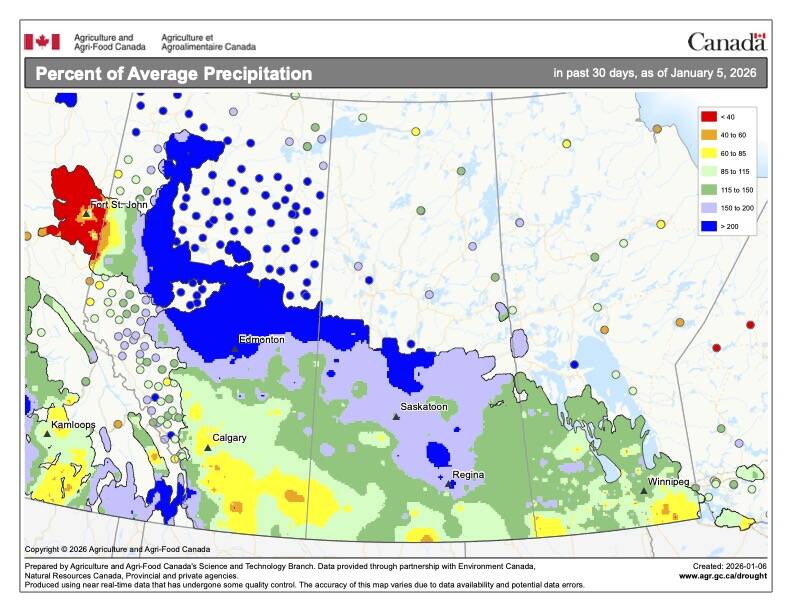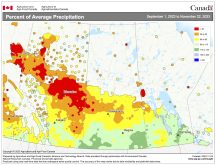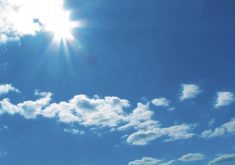During the win-ter months the one thing I probably hear the most in regard to global warming and climate change is “how can it be so cold if we are experiencing global warming?” or “we just broke a record low, where’s global warming now?”
At first glance these comments kind of make sense. After all, shouldn’t we be seeing record warm temperatures instead of seeing record cold temperatures? If climate was measured on the scale of days, then these statements would hold some truth, the problem is, climate is not measured in days but in months and years.
Read Also

The lowdown on winter storms on the Prairies
It takes more than just a trough of low pressure to develop an Alberta Clipper or Colorado Low, which are the biggest winter storms in Manitoba. It also takes humidity, temperature changes and a host of other variables coming into play.
Day-to-day weather is just that, weather, and weather is variable and will always be that way. Different atmospheric conditions will come together at different times to give us short periods of either very warm temperatures or very cold temperatures. Daily weather is highly variable and is not the best way to examine whether global temperatures are warming, cooling, or simply staying the same.
So what would work better? Since climate is the measure of weather over long periods of time, instead of examining daily weather records researchers have focused in on monthly weather records as they are more reflective of long-term climate change than short-term daily fluctuations. Unfortunately, the best study I have found on this is based on 303 American cities chosen due to their long and reliable weather records. The reason I say unfortunately is that it would be interesting to see if the statistics for these American cities would be mirrored in Canada. My feeling is that they would, and when I have some time I will attempt to check this out.
Looking at this study of monthly temperatures, some very interesting results were brought to light. While we have seen some record cold temperatures over the last eight years, when we look at monthly temperatures, there have been only two record cold months and that is looking at all 303 stations! During this same time period (2000-08) there have been 101 record warm months. Of these 101 record warm months, 61 of them broke records as the all-time warmest month ever recorded.
So far this decade seems to be turning out to be fairly warm, the next question is how does this compare to previous decades? Looking at the 1990s, these same 303 cities recorded 81 record warm months and 27 record cold months. This trend continues when we look at the 1980’s. During this decade, 68 record warm months were recorded along with 48 record cold months. This trend towards lower numbers of record warm months and a larger number of record cold months continues into the 1970s. During this decade only 21 record warm months were recorded while 119 record cold months occurred.
During the ’50s and ’60s this trend disappears and we see a fairly even distribution of record warm and cold months. The 1940s turned out to be a cold decade with only 19 record warm months and 101 record cold months. Looking at the 1930s we see an interesting result. This decade represents the dust bowl years with plenty of stories of heat waves and drought. People often refer to this time period and state that there was not global warming then and yet look how hot it was. When we look at the monthly records for this time period we indeed see a huge spike in the number of record warm months with a total of 156 records. We would have to see a really significant heat wave this year to even have a chance of this decade beating that number.
Now, what is interesting about the 1930’s is that while they broke a large number of warm records, the decade also had its fair share of record cold months. In fact, the 1930s saw the second-greatest number of monthly cold records – 101. This makes the 1930s significantly different than our current decade, which has only seen two cold records.
Take from these numbers what you will, but to me they seem to be pointing towards the fact that over the last 30 years we have been seeing a trend towards more record warm months and fewer record cold months. I guess the real question when we get right down to it is: will this trend continue into the decade or is this trend simply a natural occurrence?
One more thing, I don’t have enough room to discuss this, but for those of you who are thinking aha, you have forgotten about the urban heat island effect. Well, this study has taken that into account.

















